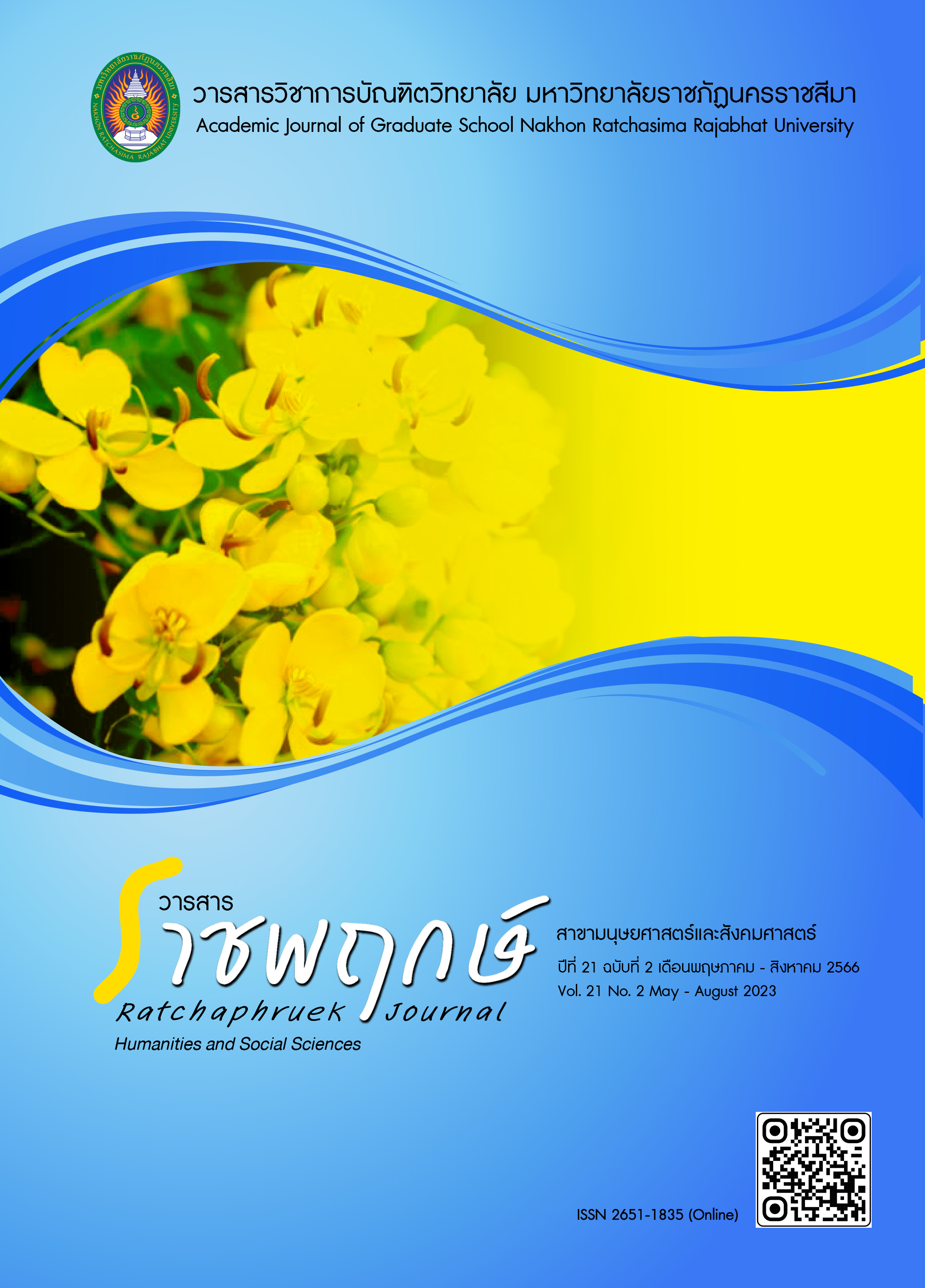Positive Psychology Program to Enhance Students’ Social Adjustment in a Transition from Primary to Secondary Grades
Main Article Content
Abstract
The objectives of this research were as followings: to study the effectiveness of a positive psychology program to enhance social adjustment of students transitioning from primary to secondary grades. The methodology used was experimental research. The target group was grade 7 students of the second semester of the academic year 2022 at Kasetsart University Laboratory School Center for Educational Research and Development period. 40 participants were divided into experimental groups and a control group of 20 participants each using a purposive sampling method according to the inclusion criteria. The research instruments used in the experiment were:1) a Social Adjustment Scale, 2) 10 activities from a Positive Psychology Program to Enhance Social Adjustment, and 3) After Action Review. Statistics used in data analysis were mean, standard deviation, and t-test.
The results showed that after the experiment, the experimental group students had social adjustment scores higher than before the experiment and that the control group had a statistical significance at the .01 level. Therefore, this research shows that a positive psychology program with enhancing social adjustment can increase students' social adjustment. This will be useful for students during the transition from primary to secondary grades to be able to happily adapt to situations and live in society.
Article Details

This work is licensed under a Creative Commons Attribution-NonCommercial-NoDerivatives 4.0 International License.
References
โชติกา กังสนันท์. (2564). รอยเชื่อมต่อทางการศึกษาจากประถมศึกษาสู่ระดับมัธยมศึกษา. วารสารมหาจุฬานาครทรรศน์, 8(9), น. 34-46.
นันท์ชัตสัณห์ สกุลพงศ์, ขวัญใจ ฤทธิ์คำรพ และไพลิน ลิ้มวัฒนชัย. (2562). ผลของกิจกรรมกลุ่มด้านจิตวิทยาเชิงบวกต่อความสุขและการปรับตัวทางสังคมของนักเรียนชั้นมัธยมศึกษาในโรงเรียนประจำ: การวิจัยแบบผสานวิธี. วารสารพฤติกรรมศาสตร์เพื่อการพัฒนา, 11(1), น. 35-52.
นิรมล สุวรรณโคตร. (2553). การปรับตัวของนิสิต ระดับปริญญาตรีชั้นปีที่ 1 มหาวิทยาลัยนเรศวร(วิทยานิพนธ์มหาบัณฑิต, มหาวิทยาลัยศรีนครินทรวิโรฒ).
เพ็ญประภา ลูกอินทร์, อรนุช ศรีสะอาด และปรีชา จันทวี. (2559). พัฒนาการปรับตัวทางสังคมของนักเรียนชั้นมัธยมศึกษาปีที่ 1 โดยใช้กิจกรรมเสริมสร้างการปรับตัวทางสังคม: ประยุกต์ใช้แนวคิดการประเมินตนเอง. วารสารการวัดผลการศึกษา มหาวิทยาลัยมหาสารคาม, 22(1), น. 225-236.
สุดารัตน์ ตันติวิวัทน์. (2560). จิตวิทยาเชิงบวก: การพัฒนาการประยุกต์และความท้าทาย. วารสารพฤติกรรมศาสตร์เพื่อการพัฒนา, 9(1), น. 277-290.
อัจศรา ประเสริฐสิน. (2563). เครื่องมือการวิจัยทางการศึกษาและสังคมศาสตร์. กรุงเทพฯ: จุฬาลงกรณ์มหาวิทยาลัย.
Benoit, V. & Gabola, P. (2021). Effects of Positive Psychology Interventions on the Well-Being of Young Children: A Systematic Literature Review. International Journal of Environmental Research and Public Health, 18(22), pp. 1-19. Retrieved June 3, 2023, from https://doi.org/10.3390/ijerph182212065
Lester, L. & Cross, D. (2015). The Relationship Between School Climate and Mental and Emotional Wellbeing Over the Transition from Primary to Secondary School. Psychology of Well-Being, 5(1), pp. 1-15. Retrieved September 3, 2021, from https://doi.org/10.1186/s13612-015-0037-8
Morrison, K. (1998). Management Theories for Educational Change. London: SAGE.
Rogers, C. (1967). Client-Centered Therapy. Boston: Houghton Miffin.
Saville K., Leaton Gray S. L., Perryman J. & Hargreaves E. (2023). Creating year 7 bubbles to support primary to secondary school transition: A positive pandemic outcome?, Education 3-13, 51(3), pp. 1-13. Retrieved March 25, 2023, from https://doi.org/ 10.1080/03004279. 2023.2186977
Seligman, M. E. P. (2011). Flourish: A visionary new understanding of happiness and well- being. New York: Atria Books.
Smith, B. W., deCruz-Dixon, N., Erickson, K., Guzman, A., Phan, A., & Schodt, K. (2023). The Effects of an Online Positive Psychology Course on Happiness, Health, and Well-Being. J Happiness Studies, 24(3), pp. 1145–1167. Retrieved March 25, 2023, from https://doi.org/10.1007/s10902-022-00577-4
Van Rens, M., Haelermans, C., Groot, W., & Van Den Brink, H. M. (2019). Girls’ and Boys’ Perceptions of the Transition from Primary to Secondary School. Child Indicators Research, 12(4), pp. 1481-1506. Retrieved February 15, 2022, from https://doi.org/ 10.1007 /s12187-018-9591-y
Wagner, L., Gander, F., Proyer, R. T., & Ruch, W. (2020). Character strengths and PERMA: Investigating the relationships of character strengths with a multidimensional framework of well-being. Applied Research in Quality of Life, 15(2), pp. 307-328. Retrieved February 15, 2022, from https://doi.org/10.1007/s11482-018-9695-z
West, P., Sweeting, H., & Young, R. (2010). Transition matters: Pupils’ experiences of the primary-secondary school transition in the west of Scotland and consequences for well-being and attainment. Research Papers in Education, 25(1), pp. 21-50. Retrieved February 15, 2022, from https://doi.org/10.1080/02671520802308677
Xiaohan, C. & Tongxian, C. (2022). Positive Psychology Based on Cognitive and Behavioral Intervention among Adolescents with Learning Difficulties: Current and Future Application. Journal of Clinical Medicine, 25(1), pp. 102-105. Retrieved June 3, 2023, from https://doi.org/10.32629/jcmr.v3i3.960


